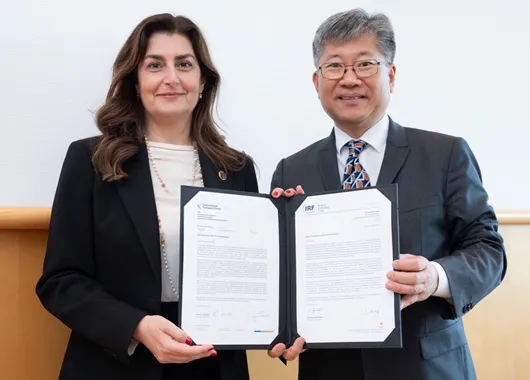
The International Road Federation (IRF Geneva) has signed separate Memoranda of Understanding (MoUs) with two organisations: the International Transport Forum (ITF) and the Union for the Mediterranean (UfM).
Transport policy thinktank ITF is linked to the Organisation for Economic Cooperation and Development (OECD).
Susanna Zammataro, director general of IRF Geneva, says: "We firmly believe in the power of collaborations to deliver meaningful change."
IRF Geneva and ITF "are uniquely positioned to pioneer innovative initiatives that address the evolving challenges and opportunities in the global mobility landscape".
By combining IRF's understanding of road infrastructure with ITF's policy expertise, the partnership "seeks to pioneer innovative solutions in areas such as road safety, decarbonisation, digitalisation and financing mechanisms tailored to the sector's needs".
They will collaborate on events, workshops, project development and data analysis.
“The collaboration between ITF and IRF holds great promise for driving positive change in the transport sector," agrees Young Tae Kim, ITF secretary general. "Together, we can address pressing challenges, foster innovation, and create a more sustainable and inclusive transportation system by combining our expertise and resources.”
Meanwhile, IRF's MoU with UfM is designed to advance sustainable road transport across the Euro-Mediterranean Region in the face of "unprecedented challenges".

UfM is an intergovernmental organisation bringing together the 27 Member States of the European Union and 16 southern and eastern Mediterranean countries.
IRF Geneva says the new strategic alliance with UfM will allow the organisations "to pool their expertise and resources, address pressing challenges and seize opportunities in the road transport and mobility sectors, ultimately contributing to the region's sustainable development and prosperity."
Road safety, decarbonisation, digitalisation and innovation are among the areas on which the IRF and UfM will work closely to exchange information, coordinate activities and organise joint initiatives.
For "at least three years" the parties will collaborate on professional training courses, conferences, and projects in addition to data collection and analysis.
UfM head of sector for transport, Francesc Carbonell, explains: “The goal of the UfM in the field of transport is to achieve a gradual, but solid progress towards developing an integrated, multimodal, efficient, sustainable and resilient transport network, with a view to achieving deeper integration among Euro-Mediterranean countries."
He called the MoU "a significant step forward in our efforts to enhance mobility and connectivity across the region".
Both agreements were signed at the ITF Annual Summit in Leipzig.









